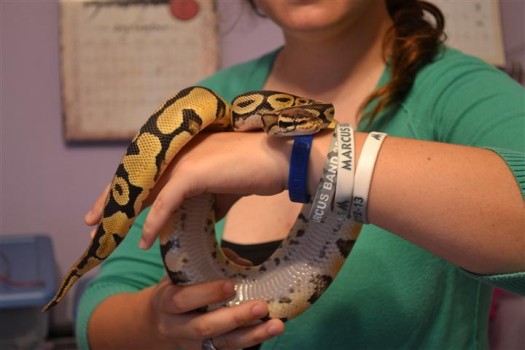Slithery sidekicks
Junior collects snakes, breeds them for profit
Junior Angela Hoffman holds one of her ball python snakes. She owns eight of them as pets in her home. Snake breeding is one her hobbies that earns her extra pocket money.
Junior Angela Hoffman has a thing for snakes.
It all started two summers ago when her friend, Scarlet Christian, a recent graduate, took her to The Lone Star Reptile Expos, a reptile convention. Hoffman was surrounded by all sorts of creepy-crawlies. Reptiles, tarantulas, amphibians, rodents, snakes. A giant turtle sat in the corner in a bathtub, munching on a head of lettuce. An anaconda lay at one table, striking, biting and flailing. The room was small and hot and smelled like snake droppings.
To most, this would be some sort of scaly nightmare. At first, Hoffman wasn’t a big fan of the slithering critters. In fact, she was terrified of the anaconda. She turned around to hide her eyes, and that’s when she saw him – a small, peaceful-looking ball python in a tank at a lone table. The couple running the booth offered him to her. Hoffman braced herself and held the snake. That’s when everything changed.
“He was friendly,” Hoffman said. “He slithered in my hand and seemed so calm…I fell in love with him and bought him on the spot for $90.”
Thus began Hoffman’s love affair with snakes – her first being the ball python, Osiris. Found in Africa, these types of snakes typically only grow to be less than three feet long. They’re docile and will ‘ball’ up instead of striking when threatened.As a new snake owner, Hoffman decided ball pythons were the best choice. She took him home and put him in a large enclosure in her bedroom, complete with branches to play on and mulch flooring to burrow under.
“Osiris [is] my precious snake,” Hoffman said. “I pamper him to no extent.”
One night, Hoffman was holding Osiris, letting him explore her arm. It was late, and she was tired. Soon enough, she fell asleep with Osiris still wrapped around her arm. He eventually coiled up under her hand and fell asleep himself.
“He’s different,” Hoffman said. “He’s friendly and [would] never hurt a person.”
Hoffman loves snakes so much that she’s collected eight ball pythons.Osiris, Lady, Artemis, Apollo, Isis, Odin, Hooplah and Kevin. Extremely popular among reptile enthusiasts like Hoffman, ball pythons are known for their pattern and color mutations, or morphs.
“They all have special genes in them that make them look different than a normal ball python,” Hoffman said.
Not only does Hoffman collect these kinds of snakes, but she takes it one step further. She is the mother of these snakes. She is a snake breeder.
“There’s so much to discover about ball pythons regarding their amazing genes and we want to be a part of it,” Hoffman said.
Christian, who owns 30 ball pythons, had the idea of breeding their snakes together. Right now they keep their reptiles at home since they’re too young to have a facility. But in three years, they plan to rent one out to use for their snakes.
“I keep [the snakes] in ‘snake racks’ I built…out of plastic shelving, heat tape, white board and plastic tupperware tubs,” Hoffman said. “They love tight spaces so this is no problem.”
Each snake has a dog dish as a water bowl. Christian picks up their food, a diet of mice and rats, from The Big Cheese Rodent Factory in Fort Worth. The snakes eat once a week, and constant care and cleaning is required. Hoffman has to keep her bedroom at 85 to 91 degrees for her snakes’ comfort.
Producing more snakes is what the duo is focused on right now. Next year, Hoffman and Christian plan to do a breeder’s loan. They’ll each breed one of their snakes with the others and split the clutch of eggs. After incubating the eggs for two months, they’ll hatch.
“We’ll have…over a dozen females producing clutches,” Hoffman said. “That’s between three to 10 eggs each. Imagine having that many snakes!”
Once the eggs hatch, they plan to sell the snakes. Right now the girls sell them on their Facebook pages. So far, with the help of Hoffman, Christian has already sold a few snakes.
“We’ve only made a couple hundred [dollars]…but we just started breeding,” Hoffman said.
One of the possible snake egg outcomes planned for next year will produce a snake worth $900. Yet money isn’t the only thing Hoffman is working for. She has other goals. She wants to be a leading producer of snakes with the VPI axanthic morph, a type of ball python gene mix. The axanthic gene takes the brown and yellow pigments out of the snakes’ skin. The product is a silvery snake.
“I hope to make it a hobby of mine and still make money, but moreover I want to produce beautiful snakes to share with the world,” Hoffman said.
To Hoffman and Christian, hatching the eggs is the most exciting part. Christian recently hatched a clutch of pastel ball pythons.
“The feeling you get from seeing the first baby come out of its egg, slithering into the world for the first time, seeing you as its first sight,” Hoffman said. “It was stunning.”
But not everyone wants to share in the world of slithering snakes. Sometimes Hoffman and Christian are frowned upon as much as their snakes. People think that they’re weird or crazy for owning so many reptiles.
“The other day I told Mr. Howard, my band director, that I got a new snake,” Hoffman said. “When I told him I had eight, the look on his face was priceless.”
Even her parents have a hard time accepting her passion.
“I don’t blame them,” Hoffman said. “To them I’m harboring eight killers. However, I know what I plan to do and people are allowed to doubt me. It hasn’t stopped me yet.”
In fact, she loves the looks and questions she gets from people when she tells them she owns snakes. It motivates her to show them the true beauty of the animal.
“They’re not puppies, that’s for sure, but they’re just like any other creature,” Hoffman said. “They just want to be nurtured.”
As Hoffman scurries around her bedroom, checking each snake-filled tub and making sure she has enough rodents, it’s clear that her snakes are her passion. Christian pulls up outside her house, rats in tow. The two laugh as they head up to Hoffman’s room.
“They’re such magnificent creatures,” Hoffman said. “I just wish the rest of the world would put aside their blind negativity for the reptile and just hold one to see what they’re really like.”











